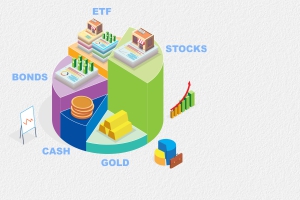In a world where there are nearly a hundred different types of investments, knowing where to invest money is perhaps the most challenging task. The information asymmetries are many due to which you are unable to make the best investment decisions. So, how do you change that? One, you need to be aware of the different types of investments that are available in the market and two, you need to know where to invest your money.
Types of investments
As you must be already aware, there exist many different types of investments that are constantly vying for your money. Let's start with some of the most common types of investments.
- Stocks:Stocks, also known as shares or equities, are perhaps the most well-known simple type of investment that is available in the market. As an investor, when you purchase the stock of a company, you are, in essence, purchasing an ownership stake in that company. The stocks of publicly traded companies are listed on leading stock exchanges where you can easily buy and sell them. Stock prices fluctuate in the short-term and change significantly over the long-term, thereby giving you an opportunity to generate investment returns. However, due to the sharp short-term movements that stock prices generally witness, directly investing in stocks is considered risky.
- Bonds:Bonds are generally issued by companies and governments when they are raising money from investors. Thus, when you are buying bonds, you are essentially lending money to the company or government issuing the bonds, making your investment more of a loan. When a bond is issued, the issuer is bound to return your money in addition to paying you a fixed coupon or interest rate on your investment. Typically, the rate of return on bonds would be lower than the returns generated by equities. On the other hand, bonds are generally considered safer than equity investments. However, you should not assume that bonds are risk-free. There are always risks of issuer default and risks stemming from changes in interest rates in the economy.
- Mutual Funds:Mutual funds are investment vehicles that pool investor money and then invest it in different investment instruments like stocks, bonds, commodities, etc., or as per different strategies, based on the investment mandate of the particular scheme. These funds are managed by expert professionals who are supported by their research team and guided by the investment mandate. Through mutual funds, you can get exposure to different types of investments that are professionally managed. Further, you can also invest in mutual funds via the Systematic Investment Plan (SIP) route that allows you to start an investment with as low as Rs. 500 and invest a fixed sum of money in your chosen mutual fund scheme as per time intervals that suit your best.
Where to invest money?
Now comes the question of where to invest money. It would be foolish to assume that just because you know about the different types of investments, you would also intuitively make the right decision with regard to where to invest money. This decision is influenced by a host of factors that include your needs, your return requirements, your risk profile, and your investment time horizon. Once you have identified these, then matching them with the different types of investments will help you determine where to invest. From that perspective, you should definitely consider to invest in mutual funds. As already highlighted, they invest across investment instruments. Thus, when you choose to invest in mutual funds, you have the option of choosing from low risk and low return debt mutual funds, high risk and potentially high return equity mutual funds or even a mix of both in the funds like balanced advantage funds. Further, there are also tax savings mutual funds available that can help you both reduce your overall tax outgo and potentially generate returns over the long-term. With so many investment options available that offer varying levels of risk and returns and are available across investment time periods, there is no reason why you should not consider to invest in mutual funds.
An investor education initiative by Edelweiss Mutual Fund
All Mutual Fund Investors have to go through a onetime KYC process. Investor should deal only with Registered Mutual Fund (RMF). For more info on KYC, RMF and procedure to lodge/redress any complaints, visit -https://www.edelweissmf.com/kyc-norms
MUTUAL FUND INVESTMENTS ARE SUBJECT TO MARKET RISKS, READ ALL SCHEME RELATED DOCUMENTS CAREFULLY
Trending Articles
MUTUAL FUND INVESTMENTS ARE SUBJECT TO MARKET RISKS, READ ALL SCHEME RELATED DOCUMENTS CAREFULLY.




















